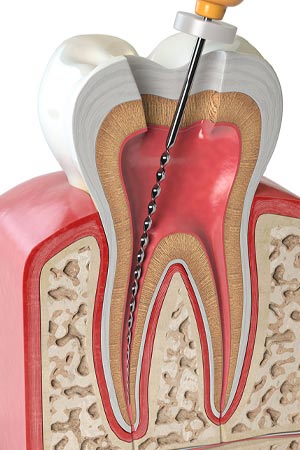Locations
Madhapur Plot No, 172, Rd Number 9, Ayyappa Society, Chanda Naik Nagar, Madhapur, Hyderabad, Telangana - 500072 Gayatri Nagar Plot no 298, beside sbi bank, Gayatri Nagar, Allapur, Borabanda, Hyderabad, Telangana - 500018 Miyapur H.no 1-258, opposite IndusInd bank, miyapur X Road, Miyapur, Hyderabad - 500049 Madhapur H.no: 2-56/23/15/5, ground floor, sainagar,madhapur, Hyderabad - 500081Root canal treatment is a dental procedure that eases pain caused by an infected or abscessed tooth. During the root canal process, the inflamed pulp is eliminated. The surfaces inside the tooth are then cleaned and disinfected, and a filling is placed to seal the space.
Signs that you may need a root canal include:
- Severe or persistent tooth pain: If you experience prolonged or intense pain in a specific tooth, especially when biting down or applying pressure, it could be a sign of infected or damaged pulp inside the tooth.
- Discoloration of the tooth: A blackening or discoloration of the tooth may indicate that the tooth's nerve and blood vessels inside the pulp are damaged.
- Persistent bad breath or foul taste: An infected tooth may cause persistent bad breath or a foul taste in your mouth.
- Sensitivity to hot and cold: Intensified sensitivity to hot and cold temperatures, even after the stimulus is taken out, may indicate an issue with the tooth's pulp.
- Swelling or tenderness in the gums: Inflamed or swollen gums around a specific tooth can be a sign of infection spreading from the tooth's root.
- Abscess formation: A pimple-like bump on the gums, known as a dental abscess, can form when the infection spreads beyond the root of the tooth.

How can the endodontic treatment save the tooth?
The endodontist eliminates the infected or inflamed pulp, carefully cleans and shapes within the root canal, then fills and seals the space. Subsequently, you will get back to your dentist, who will put a crown or other restoration on the tooth to protect and restore it to full function. After restoration, the tooth keeps on functioning like regular tooth.
What to expect after root canal?
For the first few days after a root canal, a few patients encounter sensitivity, swelling, or inflammation, while others experience an uneven bite or a reaction to the medication given by the endodontist. Regardless of the symptoms, a follow-up appointment is almost always required.
Benefits
The benefits of root canal treatment (endodontic therapy) include:
- Pain relief: Root canal treatment addresses the source of the tooth by eliminating the damaged or infected pulp, providing needed relief from toothaches.
- Save natural teeth: Root canals enable you to retain your natural tooth by preventing the need for tooth extraction, which can prompt further dental issues and the need for replacement choices like dental implants or bridges.
- Improved oral health: By removing the infection and preserving the natural tooth, root canal treatment helps in maintaining the overall oral health.
- Effective chewing: When the root canal treatment is done and the tooth is restored, you can continue with normal chewing and eating habits without discomfort.
- Natural appearance: Dental restorations, like crowns, utilized after a root canal can blend seamlessly with your natural teeth, giving you a natural and aesthetically pleasing smile.
- Long-lasting solution: With the proper oral hygiene and normal dental check-ups, a tooth treated with a root canal can endure for a lifetime, offering a durable and effective solution.
- Preventing further complications: If you carelessly leave your tooth untreated, this can prompt more extreme dental issues, like the spread of infection, bone loss, and the need for more extensive dental procedures.
- Cost-effective: Root canal treatment is often more cost-effective over the long haul when compared with tooth extraction followed by tooth replacement options like dental implants.
What happens if you do not get root canal?
When left untreated, the infection in the tooth can spread to different parts of the body, and in times even be life threatening. If you are needing a root canal, the infected pulp in the tooth should be eliminated.
